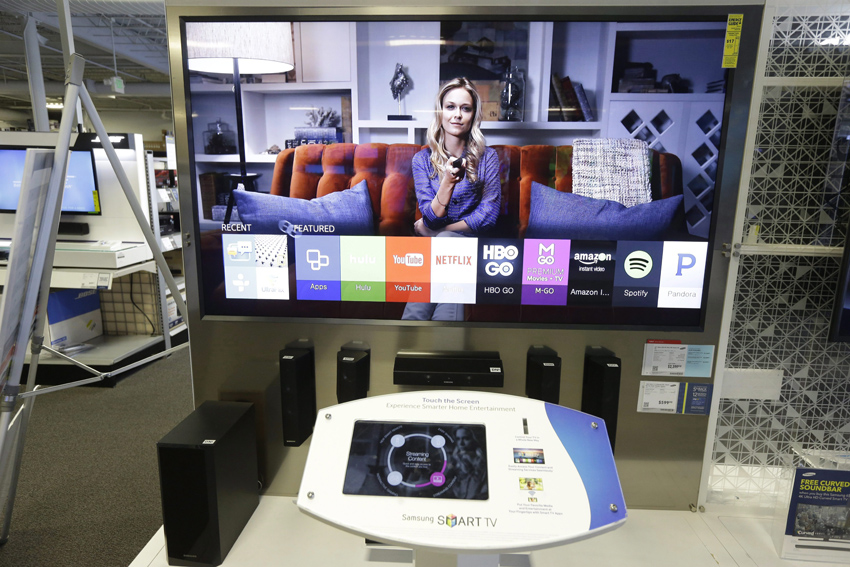Be careful what you say in front of the TV. It may be recording you. Where is that data going? We’re not sure.

If you think that’s crazy, your fridge, thermostat and wearable fitness device might be doing the same thing.
Smart appliances — part of the futuristic and vaguely defined Internet of Things — are designed to make our lives easier but they also have the potential to be intrusive in ways we’re only starting to imagine, experts warn.
“The Internet of Things is the biggest threat to privacy,” warns former Ontario privacy commissioner Ann Cavoukian.
The owners of these devices aren’t really in charge, she explains:
“At the beginning it will be a benign robot collecting data, theoretically allowing you to control it. But the reality is that the devices and sensors being built for the Internet of Things aren’t being built with that notion of control.”
The data the devices gather can be used to make an extraordinarily detailed portrait of our lives:
“People’s excitement, and manufacturers’ desire to get these things on to the market — when you combine those two, privacy is just a total secondary. Nobody is thinking about it, and they’re also thinking of it as discrete points. If you have discrete pieces of information, if they remain discrete and unconnected, it’s not a big deal. But all of these can be connected together in a networked way, putting the pieces of the puzzle together.”
The public sees the appeal of a houseful of connected, intelligent devices, but is also uneasy, she says.
“There is a huge distrust, the highest level of distrust I’ve seen with the public, both with regard to the private sector and public sector entities, ever since Edward Snowden’s revelations.”
“On the one hand you have a lot of distrust, and people saying they are concerned about their privacy … and then on the other hand the disconnect with things like Fitbits and wearable devices, and connected cars. They’re not seeing the privacy implications, nor would I expect them to.”
Your TV may be recording what is said around it, and sending sound files off, who knows where.
As warnings go, it seems a little difficult to take seriously, even a bit unhinged – except that it came from Samsung’s own privacy policy for its voice-activated Smart TVs:
“Please be aware that if your spoken words include personal or other sensitive information, that information will be among the data captured and transmitted to a third party through your use of Voice Recognition.”
Smart TV owners don’t have to use the feature, Samsung pointed out in a clarification published after an uproar when the policy was finally noticed in early 2015, titled “Samsung Smart TVs Do Not Monitor Living Room Conversations.”
READ MORE: Samsung under fire for Smart TV feature that listens to conversations
For University of Toronto law professor Lisa Austin, an expert on privacy, the Internet of Things challenges the already-fraying boundary between being online and not being online.
“The thing about the IoT that interests me is that it has pulled us away from this idea that the Internet, and cyberspace, is something out there. When I’m connected on my computer, I’m on the Internet, and I understand that I leave digital footprints on the Internet, but the IoT you do it all the time, increasingly. You carry your phone around, and all sorts of people can tell where you are.”
“The thing about the rest of the world now, when you drive, when you have these various things on your car, all these things, you can be tracked in all sorts of ways, not just physically, but lots of people can figure out what you’re doing. So our lives leave digital tracks, not just when we’re shopping on the Internet. And I find that interesting, and I don’t think we think about it quite enough.”
READ MORE: Every move you make: Privacy expert wary as insurers track drivers
A smart thermostat can save you money by being intelligent about knowing just how much energy your household needs — for example, by tracking whether people are in a room, and opening and closing heating vents based on that. But along with that comes a need to gather data about the comings and goings inside your house, Cavoukian points out.
“It’s so attractive, and that’s why people leap to it,” Cavoukian says.
“The cost is low, it can do all this cool stuff. I’m not anti-technology – this stuff is amazing. But you have to go into it with your eyes open, and understand the consequences. The long-term vision, on the part of these tech guys, is that the Internet is going to be able to think and sense and act – that’s why they’re comparing it to a world-sized robot.”
If you’re in the business of surveillance, things naturally look different.
In a 2012 speech, then-CIA director David Petraeus was bullish about the IoT’s potential for intelligence-gathering by his agency — and wary of its use by hostile ones:
“The number of data points that can be collected is virtually limitless — presenting, of course, both enormous intelligence opportunities and equally large counterintelligence challenges,” he said.
The Internet of Things offers “… near-continuous, persistent monitoring of virtually anywhere we choose.”




Comments